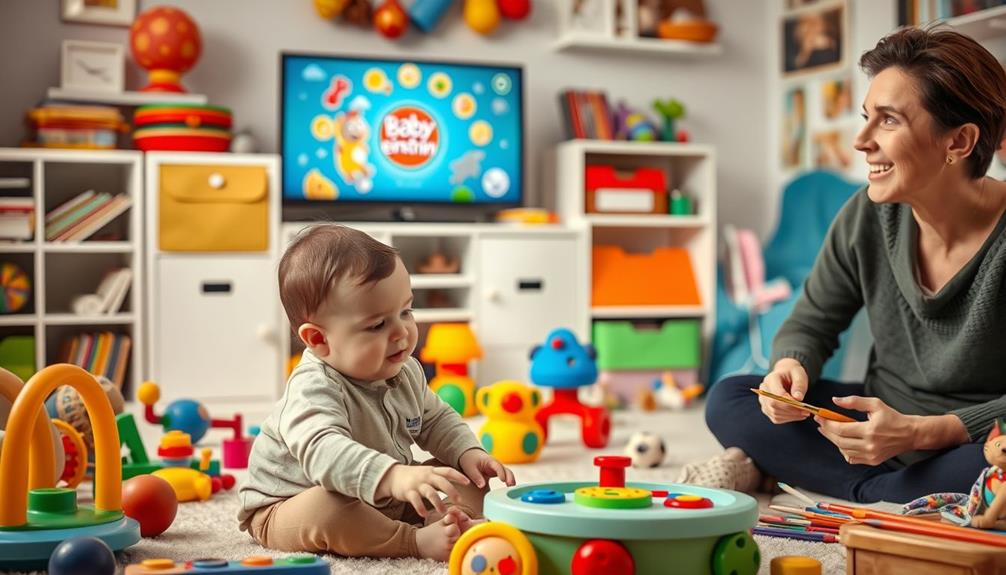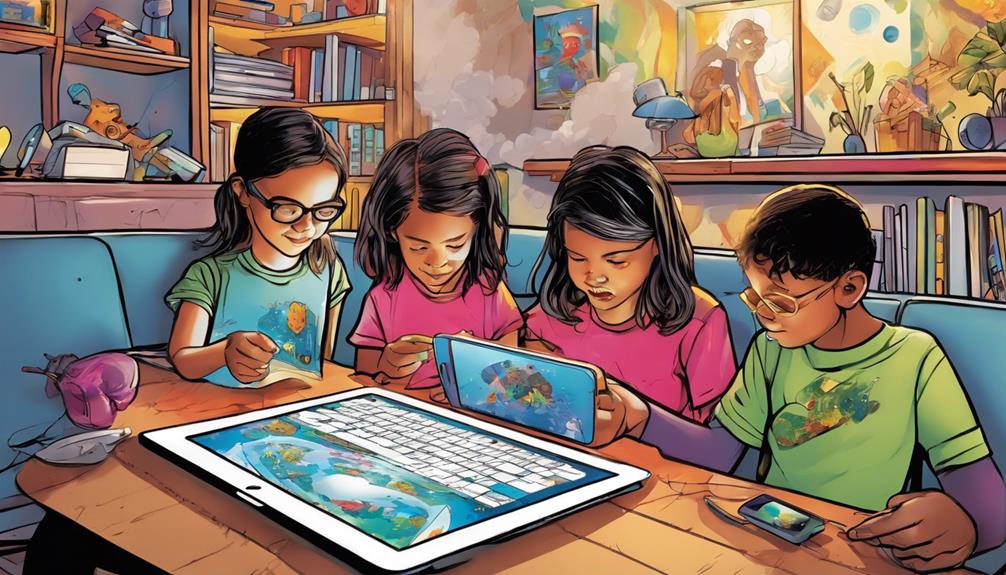Baby Einstein's approach to early learning offers a mix of benefits and drawbacks. It's popular for its engaging visuals and classical music, capturing your baby's interest. However, studies show that kids who watch these videos may learn fewer words and score lower on language assessments. The American Academy of Pediatrics advises against screen time for children under two, emphasizing that face-to-face interactions are essential for development. While some parents find value in the content, experts encourage prioritizing active play and direct communication. Curious about how to balance media and interaction? There's more to uncover about effective learning strategies.
Key Takeaways
- Baby Einstein gained popularity for its engaging content, but research shows it may hinder vocabulary development in infants compared to peers.
- The American Academy of Pediatrics recommends no screen time for children under 2 years, emphasizing direct interactions for language growth.
- Play-based learning is favored for cognitive and emotional development, promoting problem-solving, social skills, and creativity over passive video consumption.
- Advocacy groups criticized Baby Einstein's misleading educational claims, resulting in a class-action lawsuit and the removal of "educational" from branding.
- Parental engagement through interactive communication is essential for optimal child development, overshadowing the benefits of passive media.
Origins of Baby Einstein
Baby Einstein has its roots in the creative vision of Julie Aigner-Clark, who, as a stay-at-home mom in Colorado, wanted to provide infants with engaging educational content. In 1996, she founded Baby Einstein with a goal to enrich early childhood experiences through enchanting videos tailored for babies as young as six months.
Her initiative aligns with the broader movement of family activities that promote creativity, emphasizing the importance of early learning in a nurturing environment. With just an $18,000 budget and a borrowed camcorder, she crafted the first Baby Einstein video in her basement.
The brand quickly gained traction, culminating in its sale to Disney in 2001 for approximately $25 million. Its rise in popularity was markedly boosted after being showcased on the Oprah Winfrey Show and receiving commendation from President Bush during a State of the Union address.
By 2002, Baby Einstein videos had become a household staple, with studies revealing that one-third of American babies aged six months to two years had watched at least one of the videos.
Julie's innovative approach not only transformed early childhood entertainment but also set a new standard for educational content for infants, making Baby Einstein a beloved brand among parents seeking quality learning experiences for their little ones.
The Rise in Popularity
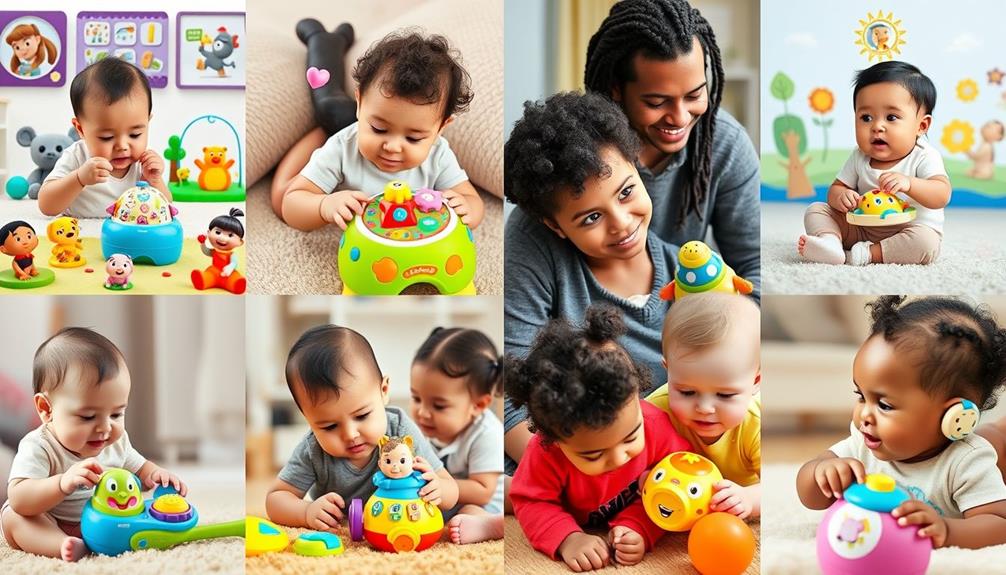
You've probably noticed how marketing strategies shaped the rise of early learning products like Baby Einstein.
With a surge in parental demand for engaging educational content, these videos quickly became a go-to choice for families seeking educational entertainment.
The emphasis on nutrition and mental health in early childhood development has also contributed to their popularity.
Media influence played an essential role, capturing the attention of children and parents alike, making these videos a staple in many homes.
Early Marketing Strategies
The rise in popularity of early learning products, particularly those targeting infants, showcases how effective marketing strategies can transform a simple idea into a household name.
Baby Einstein, founded by Julie Aigner-Clark in 1996, quickly gained traction thanks to savvy promotional moves. Here are some key strategies that fueled its success:
- Niche targeting: Videos focused on educating infants from six months old, tapping into a specific demographic.
- Engaging content: Themes like Baby Mozart and Baby Galileo combined classical music and vibrant visuals, appealing to both babies and parents.
- Media exposure: Features on high-profile platforms, including the Oprah Winfrey Show, helped spread the word.
- Endorsements: Praise from influential figures, like President Bush, boosted credibility and visibility.
- Strategic acquisition: Disney's 2001 buyout for $25 million underscored the brand's significant impact and market potential.
Parental Demand Surge
A remarkable surge in parental demand for early learning products has transformed how families approach infant education. Since the launch of Baby Einstein in 1996, millions of families have turned to these videos for educational entertainment.
By 2002, about one-third of American babies aged 6 months to 2 years had watched at least one Baby Einstein video, making it a household staple. This rapid rise in popularity was fueled by significant media attention, including features on The Oprah Winfrey Show and even mentions by influential figures like President Bush.
Parents reported astonishing usage rates, with some children watching Baby Einstein videos up to 10 times a day. This highlights the strong demand for screen-based educational content, as families sought ways to engage their infants.
The brand's success culminated in its sale to Disney in 2001 for around $25 million, signaling both its growth and the high parental demand for such products.
As you navigate this landscape, it's crucial to reflect on both the benefits and potential drawbacks of incorporating screen time into early learning, ensuring that your choices align with your family's values and educational goals.
Media Influence on Children
In recent years, media's influence on children has skyrocketed, shaping their early learning experiences in unprecedented ways. Since the launch of Baby Einstein videos in 1996, these engaging and colorful productions became a staple in many households by 2002.
You might be surprised to learn that by the early 2000s, about one-third of American babies aged 6 months to 2 years had watched at least one Baby Einstein video.
Here's why they gained popularity:
- Engaging themes like Baby Mozart and Baby Galileo
- Combination of classical music with vibrant visuals
- Enchanting content that appealed to both children and parents
- Easy integration into daily routines
- Perceived benefits for children's language development
However, the narrative shifted in the mid-2000s when research began to question their educational value. Advocacy groups raised concerns over screen time's potential negative effects on young minds.
As a result, Baby Einstein had to remove the term "educational" from its marketing, reflecting changing perceptions and encouraging you to reconsider how media influences your child's early learning.
Educational Claims and Criticism
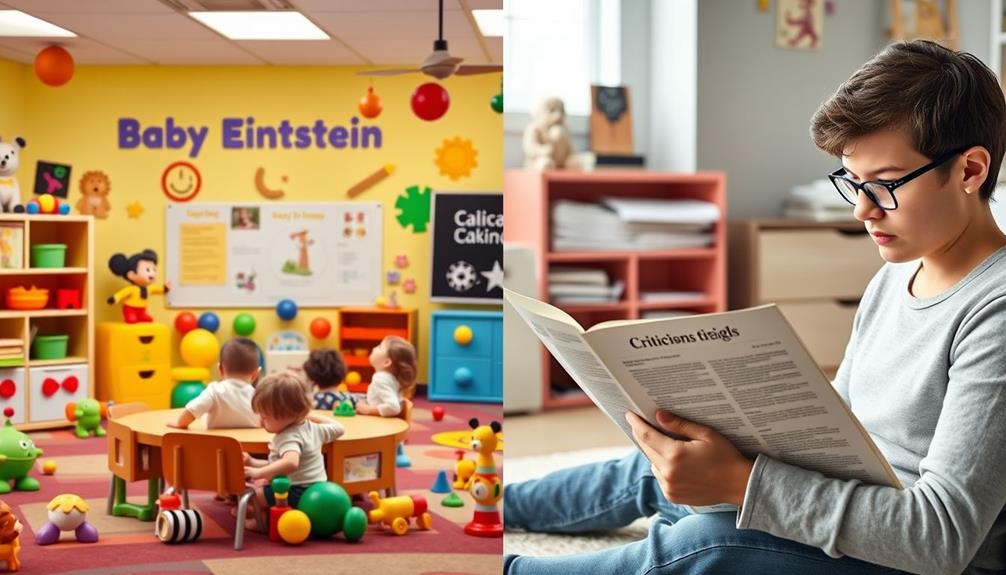
When you look at the claims made by products like Baby Einstein, it's easy to see a gap between marketing and reality. Research shows that instead of boosting vocabulary, these videos might hinder language development for infants.
This raises significant questions about the true educational value of such content and the implications for parents steering through early learning options, especially when considering the importance of regular vet check-ups to monitor developmental milestones in pets.
Additionally, understanding the effects of early exposure to various learning environments can play an essential role in shaping a child's educational journey.
Educational Value Debate
The debate surrounding the educational value of early learning tools often centers on claims made by products like Baby Einstein. Marketed as essential for cognitive development and language skills, Baby Einstein videos have drawn scrutiny from researchers and advocacy groups alike.
Here are some key points in the discussion:
- Research shows infants watching Baby Einstein learned 6-8 fewer vocabulary words than their peers.
- Studies suggest that passive video viewing might negatively impact language acquisition.
- Advocacy groups criticize the misleading nature of Baby Einstein's educational claims.
- Disney faced backlash, leading to the removal of "educational" from its advertising.
- Following a class-action lawsuit, Disney estimated $100 million in refunds, acknowledging the products' lack of educational efficacy.
These findings raise significant questions about the effectiveness of such tools for children's learning.
While parents may hope these videos will boost their child's language skills, evidence increasingly suggests otherwise.
It's vital to examine engaging, interactive methods of learning that promote active participation instead of relying on passive viewing.
Ultimately, the educational value of Baby Einstein remains a contentious issue.
Marketing Vs. Reality
Marketing often paints a rosy picture of early learning tools like Baby Einstein, claiming they can boost cognitive development and language skills in infants. However, research tells a different story. Studies reveal that babies who watch Baby Einstein videos learn 6-8 fewer vocabulary words than those who engage in more interactive learning experiences. This discrepancy raises serious concerns about the effectiveness of these videos in promoting language development.
The backlash against Baby Einstein led to a class-action lawsuit, accusing the company of misleading claims about their products' educational benefits. As a result, Disney had to offer refunds estimated at $100 million, reflecting the growing skepticism around these claims.
The American Academy of Pediatrics has also emphasized the importance of direct parent-child interaction over passive media consumption. They warn that excessive screen time could hinder your baby's early developmental progress.
In light of this criticism, Baby Einstein eventually dropped the term "educational" from its advertising. This shift in marketing strategy demonstrates a response to the scrutiny surrounding their claims, reminding parents to prioritize interactive learning experiences for their little ones instead.
Research on Language Development
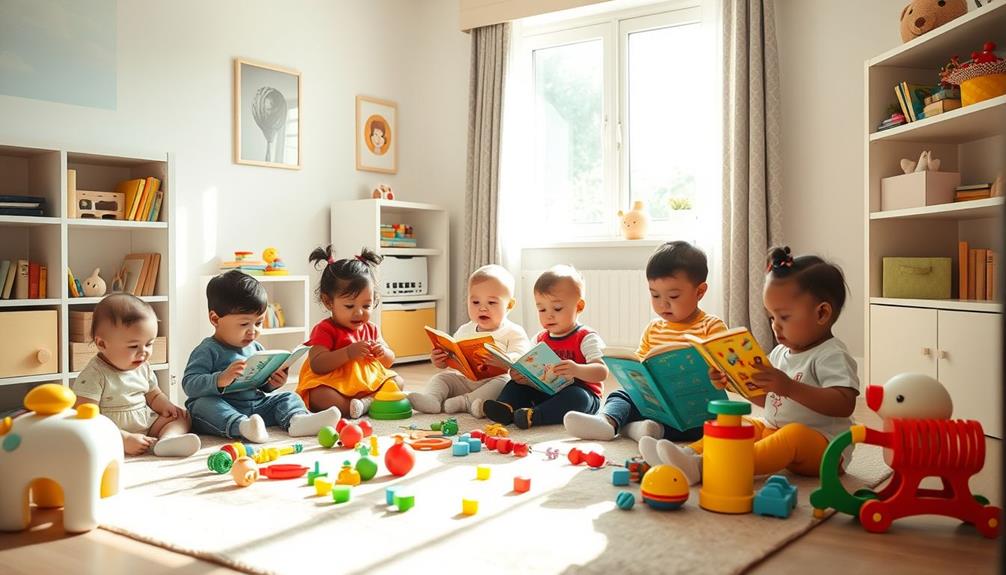
Language development in early childhood is a vital aspect of a child's growth, influencing their ability to communicate and connect with others. Research indicates that while Baby Einstein and similar television programs aim to support language skills, they may actually hinder them. This is particularly concerning as studies show that exposure to media can sometimes reflect narcissistic traits in caregivers, who may prioritize screen time over direct interaction with their children.
Here are some key findings:
- Infants aged 8-16 months who watch Baby Einstein know 6-8 fewer words than their peers.
- Babies exposed to these videos scored 10% lower on language assessments.
- Regular viewing of educational DVDs is linked to delays in language development.
- Passive screen time can impede verbal communication skills.
- The American Academy of Pediatrics emphasizes direct interaction for ideal growth.
These studies highlight that passive consumption of television programs doesn't foster effective vocabulary development. Instead, engaging in active, back-and-forth conversations with caregivers is essential.
You'll want to prioritize direct interactions over screen time to encourage your child's language development. The focus should be on meaningful exchanges, as they're far more beneficial than simply watching educational content.
Screen Time Guidelines and Impact
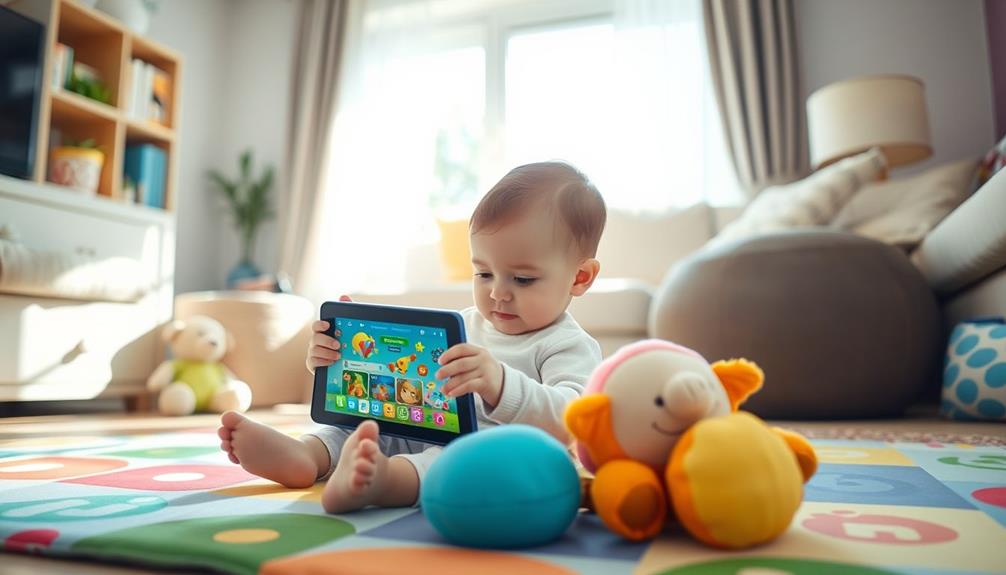
Maneuvering screen time for young children can feel overwhelming, especially with the abundance of digital content available today. The American Academy of Pediatrics (AAP) recommends no screen time for children under the age of 2, emphasizing that direct parent-child interaction is vital for brain growth and language development.
Research shows that infants aged 8-16 months who watch educational DVDs, like Baby Einstein, may know 6-8 fewer words than their peers who don't engage with such content. It's important to recognize that astrological compatibility may also play a role in shaping a child's social interactions and emotional connections, which can influence their overall development.
Excessive screen time can lead to delays in language acquisition, with studies indicating that infants exposed to Baby Einstein score about 10% lower on language skills compared to non-viewers. Additionally, the AAP warns that fast-paced content can contribute to ADHD symptoms and shorter attention spans in kids.
However, new guidelines suggest that video chatting, such as FaceTime, is acceptable for babies under 18 months if a caregiver is present. This shift towards interactive screen time highlights the significance of engagement rather than passive viewing.
Balancing screen time with meaningful interactions can help foster better language development and overall growth in your child.
Benefits of Play-Based Learning
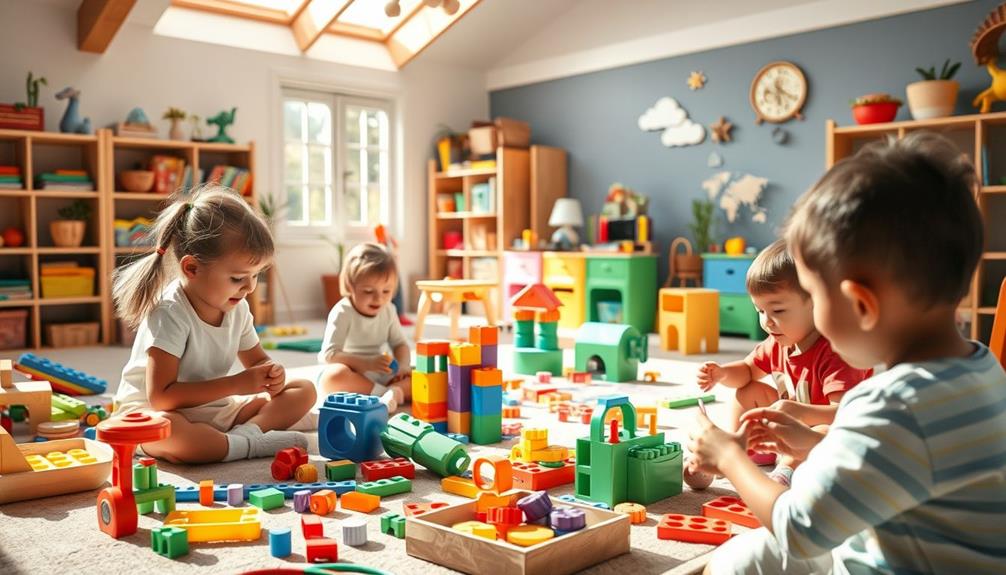
Play-based learning boosts cognitive development by tapping into your child's natural curiosity.
It not only enhances social skills but also encourages creativity and imagination, paving the way for well-rounded growth.
Engaging in different types of play, such as structured play and unstructured play, allows children to explore their surroundings while developing critical thinking and problem-solving abilities.
When kids engage in play, they're not just having fun; they're building essential skills for their future.
Enhances Cognitive Development
While engaging in play, children naturally enhance their cognitive development through hands-on experiences that align with their developmental needs.
Play-based learning is essential during these early years as it fosters important cognitive skills and supports language development. Here are some key benefits you can expect:
- Encourages Exploration: Children investigate their surroundings, leading to better problem-solving abilities.
- Boosts Creativity: Imaginative play nurtures innovative thinking and intuition.
- Improves Executive Function: Activities help with planning, self-control, and organization, which are critical for academic success.
- Supports Language Acquisition: Rich interactions during play enhance vocabulary and communication skills.
- Promotes School Readiness: Cognitive skills developed through play prepare children for the classroom environment.
Fosters Social Skills
Engaging in play is more than just fun; it's an essential way for children to develop vital social skills. Through play-based learning, kids get the chance to engage in cooperative play, which fosters teamwork and communication. This interaction not only helps them express themselves but also teaches them how to navigate social situations effectively.
| Type of Play | Skills Developed | Benefits |
|---|---|---|
| Cooperative Play | Teamwork, communication | Builds friendships |
| Guided Play by Educators | Conflict resolution, social cues | Enhances social interactions |
| Child-Directed Play | Role negotiation, collaboration | Improves peer relationships |
| Peer Play | Empathy, emotional intelligence | Fosters strong interpersonal ties |
Intentional modeling of social behaviors by educators during play enhances children's ability to navigate conflicts and build relationships. Research shows that kids with stronger social skills often perform better academically and enjoy favorable life outcomes. By engaging in play with peers, children not only enjoy themselves but also cultivate the social skills fundamental for their future success. Early learning through play is a powerful tool that shapes their emotional and social development.
Encourages Creativity and Imagination
When children immerse themselves in play, they naturally tap into their creativity and imagination, exploring self-initiated activities that reflect their unique interests. This type of play-based learning is crucial for holistic child development, allowing them to grow in several ways:
- Enhances problem-solving skills by maneuvering challenges.
- Boosts critical thinking as they make decisions during play.
- Improves empathy and social skills through collaboration with peers.
- Supports language development via storytelling and role-playing.
- Cultivates emotional growth by expressing thoughts and feelings.
As a parent or caregiver, encouraging your child to engage in imaginative play can greatly benefit their cognitive and emotional development.
Research shows that the right brain, responsible for creativity, matures considerably during early years. By fostering these self-initiated activities, you're not just allowing your child to have fun; you're equipping them with crucial skills for future success.
Social-Emotional Skill Development
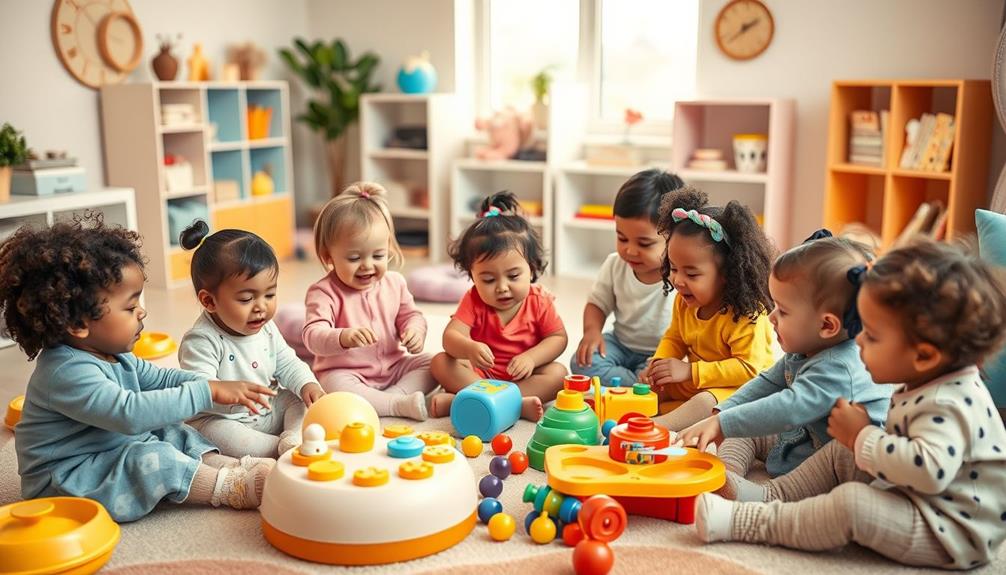
Social-emotional skill development is fundamental for young children, as it lays the foundation for their future interactions and relationships. Through play-based learning, you can see how children develop critical skills like cooperation, empathy, and conflict resolution. This child-directed play encourages them to navigate social situations, which helps foster positive relationships with peers and adults.
Incorporating elements of mind-body connection can further enhance emotional regulation, enabling children to manage their feelings more effectively during social interactions.
Research shows that children who engage in play develop stronger social skills, which correlate with better academic outcomes and enhanced life success later on. An intentional focus on social-emotional learning within early education curricula guarantees that children develop these crucial skills, paving the way for favorable developmental milestones.
Additionally, active play not only nurtures emotional regulation and self-awareness but also promotes essential motor skills and body awareness. These components are fundamental for effective social interaction and lifelong learning.
Effective Communication Strategies
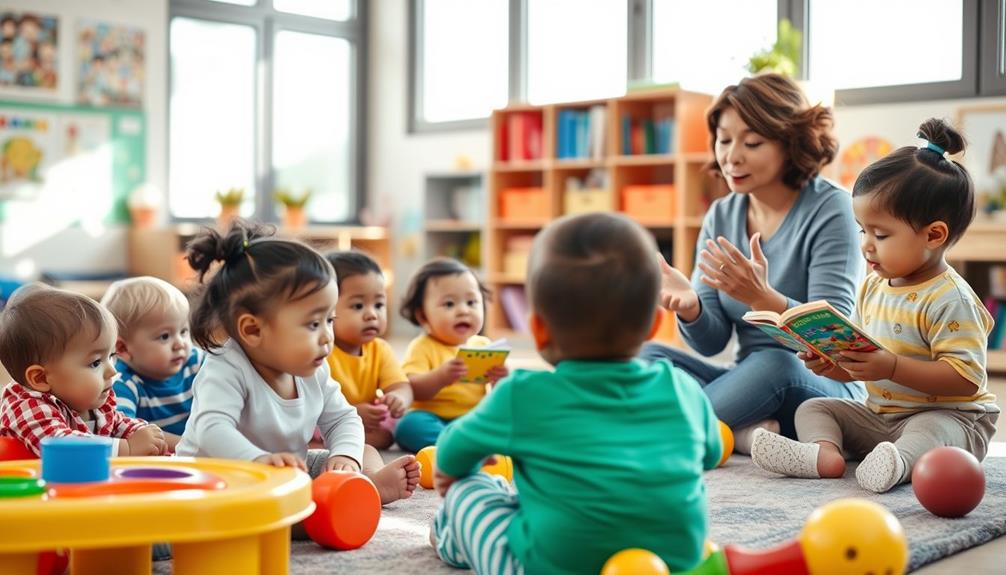
Building strong social-emotional skills naturally leads to the importance of effective communication strategies in early learning. Engaging in enjoyable back-and-forth interactions with you as a caregiver is essential for your child's language development.
Research shows that direct interactions are far more effective than passive media consumption. Incorporating toys that promote social skills, like interactive preschool role-play toys, can also enhance communication through cooperative play.
Here are some strategies to enhance your communication:
- Encourage playful dialogue: Use games and songs to promote interaction.
- Ask open-ended questions: This invites your child to express themselves freely.
- Model language: Expand on what your child says to build their vocabulary.
- Be responsive: Acknowledge your child's attempts to communicate, reinforcing their efforts.
- Create a rich verbal environment: Share stories and describe everyday activities to expose them to language.
Parental Roles and Awareness
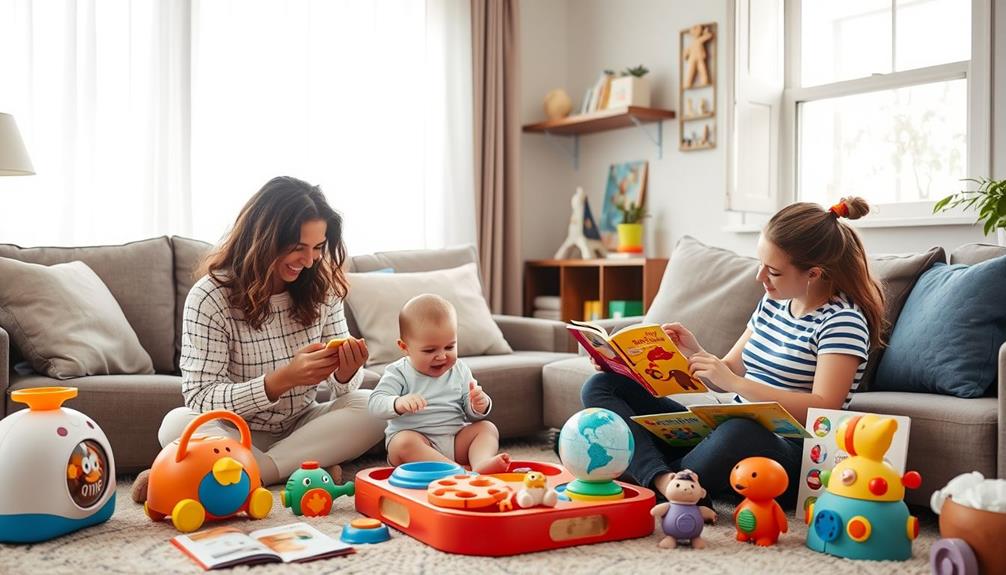
As you navigate the complexities of early childhood development, it's important to recognize your significant role in fostering your child's language skills. Research shows that interactive, responsive dialogue is far more effective for language development than passive viewing of educational videos like Baby Einstein. In fact, a study revealed that infants aged 8-16 months who watched these videos learned 6-8 fewer words than those who engaged in direct interactions with caregivers.
Additionally, engaging in face-to-face communication can enhance your child's emotional and social skills, which are crucial for their overall development, as noted in discussions about societal perceptions of remarriage.
Advocacy groups emphasize the need for parents to prioritize face-to-face communication over screen time. Early exposure to educational videos has been linked to delays in language acquisition and vocabulary development. The American Academy of Pediatrics recommends focusing on nurturing social, emotional, and cognitive skills through play and direct engagement, rather than relying heavily on screen-based content.
Being aware of the potential negative impacts of screen time is vital. Your informed decisions about media exposure can considerably influence your child's language development and overall well-being.
Legacy and Current Perspectives
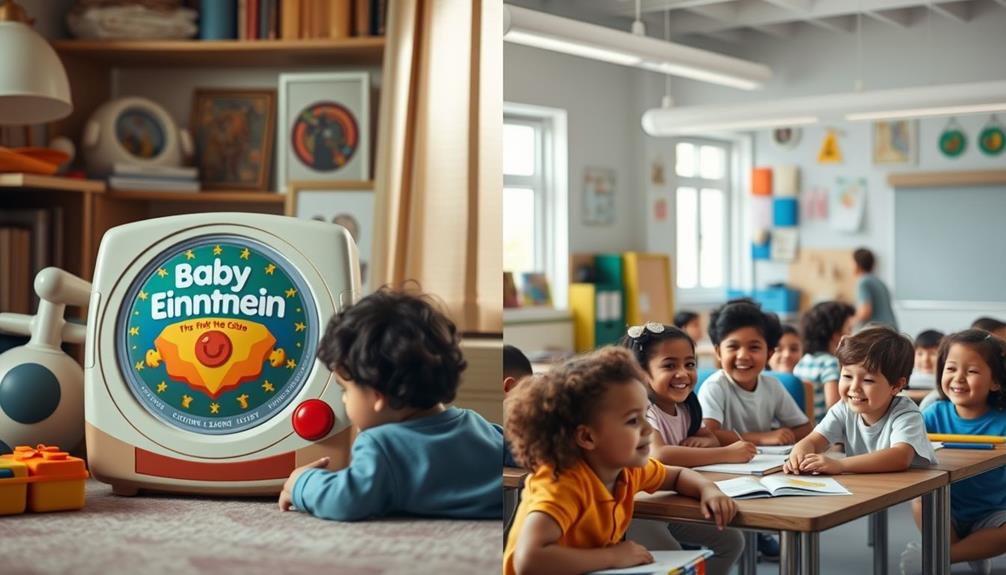
In light of the ongoing debate surrounding early learning methods, it's vital to examine the legacy of brands like Baby Einstein and their impact on child development. The rise of Baby Einstein videos brought educational entertainment into many homes, but the effectiveness of these products has faced significant scrutiny.
Recent findings suggest that a holistic lifestyle approach, which includes mindful interaction and engaging in physical activity, can greatly enhance a child's developmental outcomes, contrasting sharply with passive media consumption mindful eating practices.
Here are some key points to reflect on:
- Founded in 1996, Baby Einstein quickly became a household name after Disney's acquisition in 2001.
- Research indicates children exposed to Baby Einstein videos experienced smaller vocabulary sizes.
- Kids learned 6-8 fewer words compared to peers who didn't watch these videos.
- Following backlash, Baby Einstein removed the term "educational" from its marketing.
- The brand now focuses on toys and non-digital products, reflecting changing perceptions of early learning.
As you navigate your child's language development, it's important to weigh the influence of screen time and media.
While Baby Einstein once promised educational value, the current perspective emphasizes interactive, real-world experiences over passive video consumption.
Frequently Asked Questions
What Are the Benefits of Baby Einstein?
Baby Einstein videos can offer several benefits for your little one. They introduce concepts like music, art, and science in a fun, engaging way, which might spark your child's early interest in these subjects.
The combination of visuals and classical music can stimulate cognitive development and enhance focus. Plus, these videos can provide you with a much-needed moment of quiet, allowing you to catch your breath while your baby enjoys educational entertainment.
Is the Baby Einstein Effective?
When it comes to early learning, think of Baby Einstein as a mirage in the desert—promising but ultimately misleading.
You might wonder if it's effective, but research suggests it falls short. Studies show that infants watching these videos know fewer words compared to their peers.
Instead of passive viewing, engaging directly with your child fosters better language skills and development.
Is Little Einsteins Good for Babies?
Little Einsteins can be engaging for babies, introducing them to music and art while sparking curiosity.
You'll notice that the show features classical pieces and highlights famous artists, which could foster an early appreciation for culture.
However, it's crucial to remember that screen time shouldn't replace interactive play.
Encouraging hands-on experiences and direct interaction with you is important for your baby's cognitive and language development, so balance screen time with active engagement.
Is Baby Einstein Piano Good for Babies?
The Baby Einstein Piano can be a fun way for your baby to explore music and sounds. It encourages them to press buttons and create different musical notes, sparking their curiosity and creativity.
However, while it offers auditory stimulation, it's important to remember that active engagement with you is essential for their learning.
Balancing this product with hands-on musical experiences and social interaction can enhance your baby's cognitive development and overall enjoyment.
Conclusion
So, if you're looking to turn your little one into a miniature genius by plopping them in front of Baby Einstein, just remember: they might learn to recognize classical music but could also master the art of staring blankly at a screen. As you juggle educational claims and modern parenting, consider whether you're nurturing their minds or just training them for a future in binge-watching. After all, genius can't be downloaded—yet!

